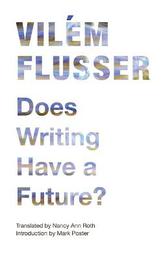
|
Does Writing Have a Future?
Paperback / softback
Main Details
| Title |
Does Writing Have a Future?
|
| Authors and Contributors |
By (author) Vilem Flusser
|
|
Translated by Nancy Ann Roth
|
|
Introduction by Mark Poster
|
| Series | Electronic Mediations |
|---|
| Physical Properties |
| Format:Paperback / softback | | Pages:208 | | Dimensions(mm): Height 203,Width 127 |
|
| ISBN/Barcode |
9780816670239
|
| Classifications | Dewey:302.2244 |
|---|
| Audience | | General | | Professional & Vocational | |
|---|
|
Publishing Details |
| Publisher |
University of Minnesota Press
|
| Imprint |
University of Minnesota Press
|
| Publication Date |
24 February 2011 |
| Publication Country |
United States
|
Description
In Does Writing Have a Future?, a remarkably perceptive work first published in German in 1987, Vilem Flusser asks what will happen to thought and communication as written communication gives way, inevitably, to digital expression. In his introduction, Flusser proposes that writing does not, in fact, have a future because everything that is now conveyed in writing-and much that cannot be-can be recorded and transmitted by other means.
Author Biography
Vilem Flusser (1920-1991) was born in Prague; emigrated to Brazil, where he taught philosophy and wrote a daily newspaper colum; and later moved to France. Among his many books that have been translated into English are The Shape of Things, Towards a Philosophy of Photography, The Freedom of the Migrant, and Writings (Minnesota, 2004). Nancy Ann Roth is an arts writer and critic based in the United Kingdom. Mark Poster is professor of history at University of California, Irvine.
Reviews"Vilem Flusser's flashes of brilliant insight, his intuitions about the psychology of gadgets and convergences, his deeply well-read and philosophically grounded investigations of wide-ranging consequences of a new literacy, are widely admired and deserve an Anglophone audience. Into the Universe of Technical Images and Does Writing Have a Future? are of the first rank in the canon of new media studies and digital culture." -Peter Krapp, author of Deja Vu: Aberrations of Cultural Memory "Perhaps a turn to Flusser will change the disregard for media that so characterizes the cultural theory of the 1970s, 1980s, and 1990s. For Flusser, however flamboyant and polemical his writing at times is, thought deeply about the emergence of electronic media and its implications for not only Western but truly global culture." -Mark Poster, from the Introduction
|